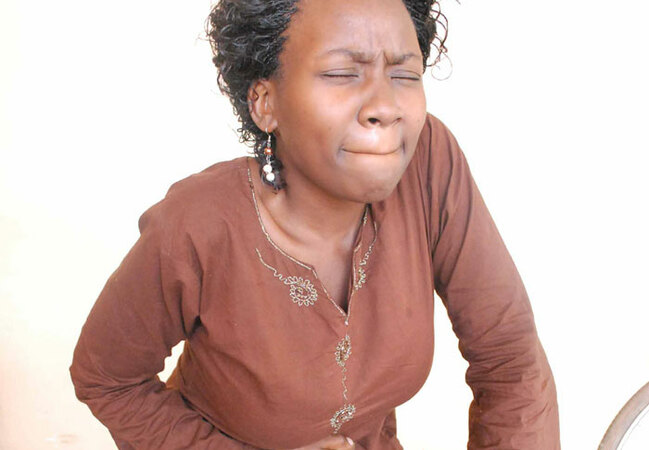Higher levels of reproductive hormones linked to severe vomiting in pregnancy
Sep 08, 2017
Hyperemesis gravidarum is a condition characterised by severe nausea and vomiting which exceeds the typical morning sickness.

PIC: A pregnant woman cradles her belly. (Credit: Agnes Kyotalengereire)
The media is awash with news that the Duke and Duchess of Cambridge are expecting their third baby. Kate is once again suffering from hyperemesis gravidarum as she did in her two previous pregnancies.
Hyperemesis gravidarum is a condition characterised by severe nausea and vomiting which exceeds the typical morning sickness, according to Dr. Gonza Andabati, a senior gynecologist/obstetrician at Bethany Women's Hospital in Luzira, Kampala.
Dr. Andabati says many mothers experience a mild type of nausea and vomiting that can be managed within two days of medication. But severity of the condition occurs in 20% to 30% of all pregnant women and it affects daily activities and requires medication. Records at Bethany Hospital indicate that in a week, they receive about two mothers with the illness.
"We admit the severe cases and observe them for a night and treat those with mild," Dr. Andabati explains.

PIC: Experts advise expectant mothers to stay away from edibles that cause nusea and vomitting, such as sweet foods. (Credit: Agnes Kyotalengereire)
Who is at risk?
The exact cause is not known, but Dr. Andabati says it is seen more among women carrying multiple pregnancies, which links it to higher levels of pregnancy hormones, especially oestrogen, progesterone and human chorionic gonadotropin (HCG).
"When a mother is expecting more than one baby, the hormones are usually higher compared to a mother carrying a single pregnancy," he says.
Additionally, during a woman's menstrual cycle, the estrogen circulating through her body rises. Once a woman conceives, the ovary (at the beginning) and later on the placenta produce higher levels of pregnancy hormones which affect the chemoreceptor ( a part of the brain), which then triggers nausea and vomiting.
Smaller mothers are also prone to the ailment because they are likely to have low blood levels and, therefore, higher concentration of the pregnancy hormones. This is as opposed to obese women, whereby fat absorbs some of the hormones, thus reducing the concentration in the blood.
Effect
The condition can have life threatening consequences on both the mother and the unborn baby, warns Musa Ebitu a nutritionist who also doubles as a maternal and child health expert. The illness, according to Ebitu, deprives the mother of essential nutrients for example sugar, electrolyte and vitamins.
"When the sugar levels reduce, a mother can collapse and become unconscious. She may die if not recognised early," Ebitu explains, adding that an accident may occur if she collapsed while driving.
Other nutrient deficiencies may manifest in form of low levels of blood, leading to anemia and low immunity, especially in mothers who have repeated pregnancies, says Dr. Andabati.
Imbalance of electrolytes resulting from deficiency of potassium may cause dysfunction of the body muscles, such as those of the skeleton and heart. This causes palpitations and sometimes heart attack if the deficiency is not corrected in time.
Repeated vomiting can deplete the body of water, but also hinder intake of water due to nausea. This results in dehydration and shock when the levels of water in the body reduce, cautions Dr. Andabati. And if nothing is done, the condition can cause death. Usually mothers seek help early because of the disturbing symptoms.
Management
The condition can be managed through medication, but Dr. Andabati recommends paying attention to diet and lifestyle. Mothers are advised to stay away from things that trigger nausea and vomiting, for example perfumes, deodorants and sugary foods. They may have to avoid eating different types of food at a meal, as it becomes difficult to identify the type of food they are reacting to.
Monica Muka, a mother of three who is always severely affected by the condition says eating dry foods like potato crisps, roasted plantain or steamed fingers of matooke give her a relief.
